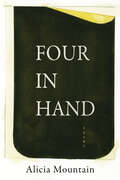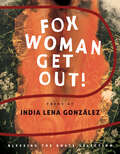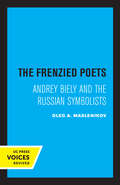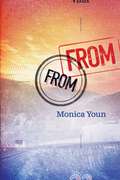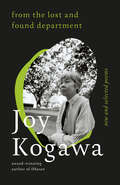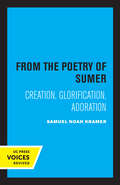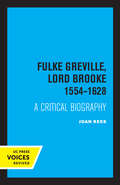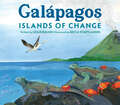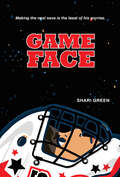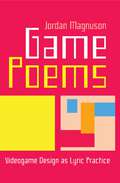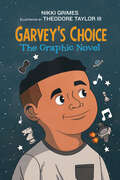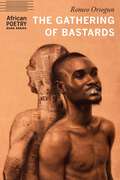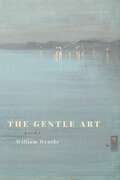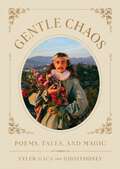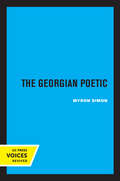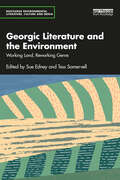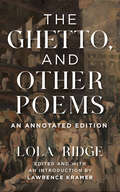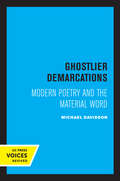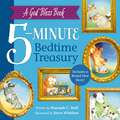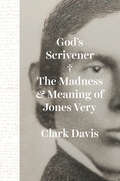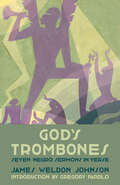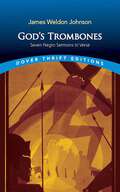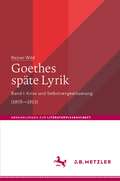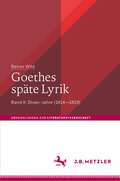- Table View
- List View
Four in Hand (American Poets Continuum Series #198)
by Alicia MountainComprised of four heroic crowns of sonnets, Alicia Mountain’s Four in Hand is both formal and experimental, ranging from lyric romantic and familial narratives to blank verses of reconfigured found text pulled from financial newsletter emails. Language and white space equally captivate with their sparsity and abundance as Mountain pursues the implications of national political identity with intersectional awareness. These poems interrogate our collective complicity in late-stage capitalism, drone warfare, the election of Donald Trump, environmental degradation, mental health crises, and the dawn of Covid-19 through the lens of gay poetic lineage, regionalism, and familial kinships structures.As in all lived experiences, treacheries and triumphs fade in and out of focus and intimacy, heartbreak, travel, eroticism, joy, and quotidian happenings offer character and momentum across non-linear narrative arcs. Through enthralling images, gripping storytelling, and world-building, Four in Hand carves out necessary space for lesbian gaze, speakership, and personhood. From the back corner of a vast, sprawling, yet gorgeous landscape of thought, Mountain's poems beckon us inside.
fox woman get out!
by India Lena GonzálezTake the body and split it wide open. Fill it with light. See the multiple interiors, the layered death, the familial mythology, the throb and splendor of being, the shedding of the body altogether: this is fox woman get out! Traveling from the corporeal to the cosmic, from life to death and back again, fox woman get out! is a full-throated performance of humanity in search of truth, ancestry, and artistic authenticity. Moving through themes of lineage, twinship, femininity and masculinity, reclamation of Indigeneity, dance, gender roles, and longing, González’s poems are a crescendo on the page. Part ecstatic elegy, part spell, this is a betwixt poetics, a kaleidoscopic, disruptive, and meditative work.
The Frenzied Poets: Andrey Biely and the Russian Symbolists
by Oleg A. MaslenikovThis title is part of UC Press's Voices Revived program, which commemorates University of California Press’s mission to seek out and cultivate the brightest minds and give them voice, reach, and impact. Drawing on a backlist dating to 1893, Voices Revived makes high-quality, peer-reviewed scholarship accessible once again using print-on-demand technology. This title was originally published in 1952.
From From: Poems
by Monica Youn“Where are you from . . . ? No—where are you from from?” It’s a question every Asian American gets asked as part of an incessant chorus saying you’ll never belong here, you’re a perpetual foreigner, you’ll always be seen as an alien, an object, or a threat. Monica Youn’s From From brilliantly evokes the conflicted consciousness of deracination. If you have no core of “authenticity,” no experience of your so-called homeland, how do you piece together an Asian American identity out of Westerners’ ideas about Asians? Your sense of yourself is part stereotype, part aspiration, part guilt. In this dazzling collection, one sequence deconstructs the sounds and letters of the word “deracinations” to create a sonic landscape of micro- and macroaggressions, assimilation, and self-doubt. A kaleidoscopic personal essay explores the racial positioning of Asian Americans and the epidemic of anti-Asian hate. Several poems titled “Study of Two Figures” anatomize and dissect the Asian other: Midas the striving, nouveau-riche father; Dr. Seuss and the imaginary daughter Chrysanthemum-Pearl he invented while authoring his anti-Japanese propaganda campaign; Pasiphaë, mother of the minotaur, and Sado, the eighteenth-century Korean prince, both condemned to containers allegorical and actual. From From is an extraordinary collection by a poet whose daring and inventive works are among the most vital in contemporary literature.
From the Lost and Found Department: New and Selected Poems
by Joy KogawaA career-spanning volume that brings together new and selected works by an iconic voice in Canadian literature.From the Lost and Found Department, by the trailblazing Joy Kogawa, is a profound work of spare, trenchant, and haunting poems that lets us stay with the quietest qualities of beauty and the sublime.This essential volume brings together thrilling new work with selected poems from The Splintered Moon (1967), A Choice of Dreams (1974), Jericho Road (1977), Woman In the Woods (1985), and A Garden of Anchors: Selected Poems (2003).Kogawa&’s poems here are evidence that our every vulnerability can open into vast channels of grace.
From the Poetry of Sumer: Creation, Glorification, Adoration (Una's Lectures #2)
by Samuel Noah KramerThis title is part of UC Press's Voices Revived program, which commemorates University of California Press’s mission to seek out and cultivate the brightest minds and give them voice, reach, and impact. Drawing on a backlist dating to 1893, Voices Revived makes high-quality, peer-reviewed scholarship accessible once again using print-on-demand technology. This title was originally published in 1979.
Fulke Greville, Lord Brooke 1554-1628: A Critical Biography
by Joan ReesThis title is part of UC Press's Voices Revived program, which commemorates University of California Press’s mission to seek out and cultivate the brightest minds and give them voice, reach, and impact. Drawing on a backlist dating to 1893, Voices Revived makes high-quality, peer-reviewed scholarship accessible once again using print-on-demand technology. This title was originally published in 1971.
Galápagos: Islands of Change
by Leslie BulionA poetic introduction to a distinctive island ecosystem that is home to many species found nowhere else on Earth.Using the same poetry/science note format as Serengeti, Galápagos tells the complex story of a young volcanic ecosystem influenced by seasonal ocean currents, where food energy moves through integrated land and sea communities, each in its own season of growth and renewal.Millions of years ago, undersea volcanos in the eastern Pacific Ocean erupted, spewing up lava, rocks, and ash that eventually formed a cluster of islands: the archipelago known as the Galápagos Islands. Over time, castaway plants and animals from hundreds of miles away arrived on the rocky shores and adapted to each island&’s changing volcanic landscape and seasonal weather variations.In these isolated locations constantly affected by shifting winds and swift ocean currents, much of the wildlife evolved into species found nowhere else on Earth. Some of the many distinctive organisms featured include giant daisy trees, Galápagos penguins, marine iguanas, blue footed boobies, and Galápagos giant tortoises.The well-researched back matter includes poetry notes, a glossary, resources, and a list of the species from this remarkable ecosystem that are highlighted in the book.
Game Face
by Shari GreenThirteen-year-old Jonah is determined to prove that anxiety won’t stop him from succeeding as his hockey team’s goalie in this dynamic novel in verse. What-ifs rattle around his brain at the worst times, like when he’s in the middle of a playoff game. What if he lets his teammates down? What if he can’t make it pro? And the biggest what-if of all, the one he keeps to himself — what if he’s like his dad, whose life is controlled by anxiety that has only gotten worse since Jonah’s mom died in a car crash? To prove that he’s not like that, Jonah is determined to succeed in the high-stress role of goalie. He and his best friend Ty have big plans for their hockey futures. But when Ty suffers a medical crisis during a pivotal game, Jonah’s anxiety ramps up to new levels It takes courage to ask for help, but Jonah starts to realize that his team goes beyond the people who lace up their skates with him every week, and maybe it’s okay to look for support on and off the ice. From the adrenaline rush of sudden-death overtime to the weight of worrying about letting your teammates — and yourself — down, this novel in verse will hook readers from the first line. Key Text Features dialogue poems Correlates to the Common Core State Standards in English Language Arts: CCSS.ELA-LITERACY.RL.4.3 Describe in depth a character, setting, or event in a story or drama, drawing on specific details in the text (e.g., a character's thoughts, words, or actions). CCSS.ELA-LITERACY.RL.4.5 Explain major differences between poems, drama, and prose, and refer to the structural elements of poems (e.g., verse, rhythm, meter) and drama (e.g., casts of characters, settings, descriptions, dialogue, stage directions) when writing or speaking about a text. CCSS.ELA-LITERACY.RL.5.4 Determine the meaning of words and phrases as they are used in a text, including figurative language such as metaphors and similes.
Game Poems: Videogame Design as Lyric Practice
by Jordan MagnusonScholars, critics, and creators describe certain videogames as being “poetic,” yet what that means or why it matters is rarely discussed. In Game Poems: Videogame Design as Lyric Practice, independent game designer Jordan Magnuson explores the convergences between game making and lyric poetry and makes the surprising proposition that videogames can operate as a kind of poetry apart from any reliance on linguistic signs or symbols. This rigorous and accessible short book first examines characteristics of lyric poetry and explores how certain videogames can be appreciated more fully when read in light of the lyric tradition—that is, when read as “game poems.” Magnuson then lays groundwork for those wishing to make game poems in practice, providing practical tips and pointers along with tools and resources. Rather than propose a monolithic framework or draw a sharp line between videogame poems and poets and their nonpoetic counterparts, Game Poems brings to light new insights for videogames and for poetry by promoting creative dialogue between disparate fields. The result is a lively account of poetic game-making praxis. “Everyone who loves the true power of games will benefit from the treasure trove of insights in Game Poems.” — Jesse Schell, author of The Art of Game Design “Magnuson shines a sensitive and incisive light on small, often moving, videogames.” — D. Fox Harrell, Ph.D., Professor of Digital Media, Computing, and Artificial Intelligence, MIT “[Game Poems] tells a new story about games— that games can be lyrical, beautiful, emotionally challenging—to inspire creators and critics alike.” —Noah Wardrip-Fruin, author of How Pac-Man Eats “Even as the news swells with impending doom for creativity, writing, and text itself, this literate and crafty book pursues poetry not through implacable algorithms but in concrete and personal play. It should be an indispensable guide for anyone who aims to maintain the true, human promise of technical poetics.”—Stuart Moulthrop, coauthor of Twining: Critical and Creative Approaches to Hypertext Narratives “For far too long videogames have flourished – and commanded both capital and attention – in a kind of counterculture that they seem to have created as if ex nihilo for themselves and their players. But we are these players, and their culture has always been integrated with all of our own. In this evenhanded artist-scholar’s ars poetica Jordan Magnuson respects the material cultural specificity of videogames while regarding them through the ‘lens of poetry’ in order to discover – and help create – a practice and an art of Game Poems within the wider field. Magnuson formally, int(erv)entionally embraces this art as lyrically poetic.”—John Cayley, Brown University “In Game Poems, Magnuson listens carefully to videogames, and hears them speak to questions of art, language, and meaning that connect our written past to our software future. Read this book and you will hear it too.”—Frank Lantz, Director, NYU Game Center “Jordan Magnuson has created a work that ties together the worlds of poetry and videogames in a deep and enlightening way. For those of us who care about the potential of poetic games, Jordan greatly improves the language of how we talk about them and expands our ability to see what this unique form can become. This is one of my favorite books on game design and I apologize in advance to those whom I will end up cornering and not being able to stop talking to about it.”—Benjamin Ellinger, Game Design Program Director, DigiPen Institute of Technology “A groundbreaking and accessible book that helps us think about games as poems. With patient tenacity, Magnuson teases out what he felt for years as he engaged in his own practice of making videogames. His mission to help us apply a ‘
Garvey's Choice: The Graphic Novel
by Nikki GrimesThis emotionally resonant novel in verse by award-winning author Nikki Grimes celebrates choosing to be true to yourself.Garvey's father has always wanted Garvey to be athletic, but Garvey is interested in astronomy, science fiction, reading—anything but sports. Feeling like a failure, he comforts himself with food. Garvey is kind, funny, smart, a loyal friend, and he is also overweight, teased by bullies, and lonely. When his only friend encourages him to join the school chorus, Garvey's life changes. The chorus finds a new soloist in Garvey, and through chorus, Garvey finds a way to accept himself, and a way to finally reach his distant father—by speaking the language of music instead of the language of sports.
The Gathering of Bastards (African Poetry Book)
by Romeo OriogunLike I knew, standing on the seashore, the hunger wracking a migrant&’s body is movement. —from Romeo Oriogun&’s &“Migrant by the Sea&”The Gathering of Bastards chronicles the movement of migrants as they navigate borders both internal and external. At the heart of these poems of vulnerability and sharp intelligence, the poet himself is the perpetual migrant embarked on forced journeys that take him across nations in West and North Africa, through Europe, and through American cities as he navigates the challenges of living through terror and loss and wrestles with the meaning of home.
The Gentle Art: Poems
by William WentheThe poems in The Gentle Art, a compelling new collection from William Wenthe, move between the life of the painter James McNeill Whistler and a poetic version of the author, who is at once inspired and disturbed by Whistler. The present-day author sheds light on Whistler’s artistic vocation and the beauty of his paintings, most notably the liminal London riverscapes that he named Nocturnes, yet recoils at the cost of Whistler’s devotion to art: lovers abandoned, friends turned into enemies, his own children given away to adoption.Creating a kind of dual biography, Wenthe grapples with feelings of admiration and disaffection toward Whistler as he tries to perform his own roles as parent, partner, and poet. While some of the poems are narrative, their overall effect is associative—two lives superimposed in a double exposure, with attention to what the contrast of two centuries, the nineteenth and the twenty-first, reveals about the relationship of art to money, class, and politics.
Gentle Chaos: Poems, Tales, and Magic
by Tyler GacaFrom the wild imagination of Tyler Gaca, also known as TikTok's Ghosthoney, comes a beautiful compendium of poems, images, personal stories, and vignettes that explore magic, queerness, Tyler&’s unique story, and the enchantment and comfort to be found in the weird, the dark, and the different. In this raw yet enchanting collection of poems, essays, photographs, and artworks, Tyler Gaca dreamily navigates themes of magic and queerness, offering readers an intimate look inside his mind and his worlds, real and imagined. The writings in Gentle Chaos reflect on growing up queer and in love with magic, discovering yourself and your place in the world, and daring to seek out love and hope. The artworks are dedicated to salvaged antique photographs, haircuts, dead moths, the creatures we dream up, and much more. The result is a whimsical, vulnerable, and transporting journey into the gentle chaos within us all.
The Georgian Poetic
by Myron SimonThis title is part of UC Press's Voices Revived program, which commemorates University of California Press’s mission to seek out and cultivate the brightest minds and give them voice, reach, and impact. Drawing on a backlist dating to 1893, Voices Revived makes high-quality, peer-reviewed scholarship accessible once again using print-on-demand technology. This title was originally published in 1975.
Georgic Literature and the Environment: Working Land, Reworking Genre (Routledge Environmental Literature, Culture and Media)
by Sue Edney Tess SomervellThis expansive edited collection explores in depth the georgic genre and its connections to the natural world. Together, its chapters demonstrate that georgic—a genre based primarily on two classical poems about farming, Virgil’s Georgics and Hesiod’s Works and Days—has been reworked by writers throughout modern and early modern English-language literary history as a way of thinking about humans’ relationships with the environment. The book is divided into three sections: Defining Georgic, Managing Nature and Eco-Georgic for the Anthropocene. It centres the georgic genre in the ecocritical conversation, giving it equal prominence with pastoral, elegy and lyric as an example of ‘nature writing’ that can speak to urgent environmental questions throughout literary history and up to the present day. It provides an overview of the myriad ways georgic has been reworked in order to address human relationships with the environment, through focused case studies on individual texts and authors, including James Grainger, William Wordsworth, Henry David Thoreau, George Eliot, Thomas Hardy, Seamus Heaney, Judith Wright and Rachel Blau DuPlessis. This is a much-needed volume for literary critics, academics and students engaged in ecocritical studies, environmental humanities and literature, addressing a significantly overlooked environmental literary genre.
The Ghetto, and Other Poems: An Annotated Edition
by Lola RidgeAt last recovered in this enriching annotated edition, this important but neglected work of American modernism offers a unique poetic encounter with the Jewish communities in New York’s Lower East Side.Long forgotten on account of her gender and left-wing politics, Lola Ridge is finally being rediscovered and read alongside such celebrated contemporaries as Hart Crane, William Carlos Williams, and Marianne Moore—all of whom knew her and admired her work. In her time Ridge was considered one of America’s leading poets, but after her death in 1941 she and her work effectively disappeared for the next seventy-five years. Her book The Ghetto and Other Poems, is a key work of American modernism, yet it has long, and unjustly, been neglected. When it was first published in 1918—in an abbreviated version in The New Republic, then in full by B. W. Huebsch five months later—The Ghetto and Other Poems was a literary sensation. The poet Alfred Kreymbourg, in a Poetry Magazine review, praised “The Ghetto” for its “sheer passion, deadly accuracy of versatile images, beauty, richness, and incisiveness of epithet, unfolding of adventures, portraiture of emotion and thought, pageantry of pushcarts—the whole lifting, falling, stumbling, mounting to a broad, symphonic rhythm.” Louis Untermeyer, writing in The New York Evening Post, found “The Ghetto” “at once personal in its piercing sympathy and epical in its sweep. It is studded with images that are surprising and yet never strained or irrelevant; it glows with a color that is barbaric, exotic, and as local as Grand Street.”The long title poem is a detailed and sympathetic account of life in the Jewish Ghetto of New York’s Lower East Side, with particular emphasis on the struggles and resilience of women. The subsequent section, “Manhattan Lights,” delves further into city life and immigrant experience, illuminating life in the Bowery. Other poems stem from Ridge’s lifelong support of the American labor movement, and from her own experience as an immigrant. This critical edition seeks to recover the attention The Ghetto, and Other Poems, and in particular the title poem, lost after Ridge’s death. The poems in the volume are as aesthetically strong as they are historically revealing. Their language combines strength and directness with startling metaphors, and their form embraces both panoramic sweep and lyrical intensity. Expertly edited and annotated by Lawrence Kramer, this first modern edition to reproduce the full 1918 publication of The Ghetto and Other Stories offers all the background and context needed for a rich, informed reading of Lola Ridge’s masterpiece.
Ghostlier Demarcations: Modern Poetry and the Material Word
by Michael DavidsonWhy do modern poets quote from dictionaries in their poems? How has the tape recorder changed the poet's voice? What has shopping to do with Gertrude Stein's aesthetics? These and other questions form the core of Ghostlier Demarcations, a study of modern poetry as a material medium. One of today's most respected critics of twentieth-century poetry and poetics, Michael Davidson argues that literary materiality has been dominated by an ideology of modernism, based on the ideal of the autonomous work of art, which has hindered our ability to read poetry as a socially critical medium. By focusing on writing as a palimpsest involving numerous layers of materiality—from the holograph manuscript to the printed book—Davidson exposes modern poetry's engagement with larger historical forces. The palimpsest that results is less a poem than an arrested stage of writing in whose layers can be discerned ghostly traces of other texts. This title is part of UC Press's Voices Revived program, which commemorates University of California Press’s mission to seek out and cultivate the brightest minds and give them voice, reach, and impact. Drawing on a backlist dating to 1893, Voices Revived makes high-quality, peer-reviewed scholarship accessible once again using print-on-demand technology. This title was originally published in 1997.
A God Bless Book 5-Minute Bedtime Treasury (A God Bless Book)
by Hannah HallSweeten up bedtime with your favorite books from the bestselling A God Bless Book series (about 1.5 million copies sold)! The simple 5-minute format makes bedtime easy, and your child is sure to drift off to sleep feeling blessed and loved. A God Bless Book 5-Minute Bedtime Treasury from beloved author Hannah C. Hall will transform your busy days to a peaceful retreat at bedtime.With just five minutes, your active little one will settle down and be captivated by these adorable animals who thank God for His amazing blessings in all parts of life. Kids will love seeing puppies playing dress-up, bear cubs tying their shoes before school, giraffes wearing fun pajamas, owls singing about God's love, and so much more! Full of soothing rhymes and cuddly artwork from Steve Whitlow, this keepsake collection of bedtime stories featuresGod Bless You and Good Night,God Bless My Friends,God Bless My Boo Boo,God Bless My Family,God Bless My School, andGod Bless My Home, a brand-new story that families will cherish.With six favorite stories combined into one beautiful book, this treasury of bedtime stories will make nighttime routines easy and sweet! Share this for Christmas or at a baby shower or gift it to a friend who is looking to create peaceful memories at bedtime.Check out other titles in the A God Bless Book series:God Bless Our BabyGod Bless Our Bedtime PrayersGod Bless Our ChristmasGod Bless Our CountryGod Bless Our EasterGod Bless Our FallGod Bless You and Good Night: Touch and Feel
God's Scrivener: The Madness and Meaning of Jones Very
by Clark DavisA biography of a long-forgotten but vital American Transcendentalist poet. In September of 1838, a few months after Ralph Waldo Emerson delivered his controversial Divinity School address, a twenty-five-year-old tutor and divinity student at Harvard named Jones Very stood before his beginning Greek class and proclaimed himself “the second coming.” Over the next twenty months, despite a brief confinement in a mental hospital, he would write more than three hundred sonnets, many of them in the voice of a prophet such as John the Baptist or even of Christ himself—all, he was quick to claim, dictated to him by the Holy Spirit. Befriended by the major figures of the Transcendentalist movement, Very strove to convert, among others, Elizabeth and Sophia Peabody, Bronson Alcott, Nathaniel Hawthorne, and most significantly, Emerson himself. Though shocking to some, his message was simple: by renouncing the individual will, anyone can become a “son of God” and thereby usher in a millennialist heaven on earth. Clark Davis’s masterful biography shows how Very came to embody both the full radicalism of Emersonian ideals and the trap of isolation and emptiness that lay in wait for those who sought complete transcendence. God’s Scrivener tells the story of Very’s life, work, and influence in depth, recovering the startling story of a forgotten American prophet, a “brave saint” whose life and work are central to the development of poetry and spirituality in America.
God's Scrivener: The Madness & Meaning of Jones Very
by Clark DavisA biography of a long-forgotten but vital American Transcendentalist poet. In September of 1838, a few months after Ralph Waldo Emerson delivered his controversial Divinity School address, a twenty-five-year-old tutor and divinity student at Harvard named Jones Very stood before his beginning Greek class and proclaimed himself “the second coming.” Over the next twenty months, despite a brief confinement in a mental hospital, he would write more than three hundred sonnets, many of them in the voice of a prophet such as John the Baptist or even of Christ himself—all, he was quick to claim, dictated to him by the Holy Spirit. Befriended by the major figures of the Transcendentalist movement, Very strove to convert, among others, Elizabeth and Sophia Peabody, Bronson Alcott, Nathaniel Hawthorne, and most significantly, Emerson himself. Though shocking to some, his message was simple: by renouncing the individual will, anyone can become a “son of God” and thereby usher in a millennialist heaven on earth. Clark Davis’s masterful biography shows how Very came to embody both the full radicalism of Emersonian ideals and the trap of isolation and emptiness that lay in wait for those who sought complete transcendence. God’s Scrivener tells the story of Very’s life, work, and influence in depth, recovering the startling story of a forgotten American prophet, a “brave saint” whose life and work are central to the development of poetry and spirituality in America.
God's Trombones: Seven Negro Sermons in Verse (Vintage Classics)
by James Weldon JohnsonA Harlem Renaissance classic: seven inspirational poems inspired by the powerful rhetorical traditions of African-American sermons and spirituals.James Weldon Johnson, the co-author of "Lift Every Voice and Sing" and author of The Autobiography of an Ex-Colored Man, was a leading figure of the Harlem Renaissance. In God's Trombones, one of his most celebrated works, the rich tradition of inspirational sermons by Black preachers are reimagined as poetry, reverberating with the musicality and splendid eloquence of the classic spirituals. This collection includes "The Creation," "The Prodigal Son," "Go Down Death (A Funeral Sermon)," "Noah Built the Ark," "The Crucifixion," "Let My People Go," and "The Judgment Day," and includes the remarkable original illustrations by artist Aaron Douglas.
God's Trombones: Seven Negro Sermons in Verse (Dover Thrift Editions: Black History)
by James Weldon JohnsonJames Weldon Johnson (1871–1938) was a revered African American civil rights leader, diplomat, lawyer, novelist, poet, and songwriter in the Harlem Renaissance. He also coauthored the hymn “Lift Every Voice and Sing,” known as the Black national anthem. God’s Trombones, one of Johnson’s most celebrated works, transforms seven uplifting spiritual sermons of African American preachers into poetry. God’s Trombones equates the Black oral tradition and its characteristic cadence with the sweeping tonal ranges of the trombone, which most closely resembles the human voice. This classic collection includes “Listen, Lord — A Prayer”; “The Creation”; “The Prodigal Son”; “Go Down Death — A Funeral Sermon”; “Noah Built the Ark”; “The Crucifixion”; “Let My People Go”; and “The Judgment Day.”
Goethes späte Lyrik: Band I: Krise und Selbstvergewisserung (1805–1813) (Abhandlungen zur Literaturwissenschaft)
by Reiner WildBand I von Reiner Wilds Gesamtdarstellung der Alterslyrik Goethes behandelt die Zeitspanne zwischen dem Todesjahr Schillers 1805 und 1813/14, dem Ende der napoleonischen Ära. Der Autor zeigt, dass sich Goethes Dichtungsverständnis nach 1805 grundlegend ändert, von der Lyrik des subjektiven Ausdrucks hin zum Gedicht als Medium der Kommunikation. Die Mehrzahl der ca. 150 Gedichte dieser Zeit sind Gelegenheitsgedichte, vor allem Gedichte an Personen, und Lieder zu geselligen Anlässen. Hinzu kommt eine Reihe von Balladen, in denen sich Goethe mit den Zeittendenzen auseinandersetzt. Zu den Neuerungen dieser Jahre gehört Goethes Interesse an Spruchdichtung, deren Produktion vor allem nach 1810 stetig zunimmt. Mit der Analyse der Gedichte und ihrer Entstehungs- und Verwendungszusammenhänge entsteht ein neues, differenzierteres Bild von Goethes lyrischem Alterswerk.
Goethes späte Lyrik: Band II: Divan-Jahre (1814–1819) (Abhandlungen zur Literaturwissenschaft)
by Reiner WildBand II von Reiner Wilds Gesamtdarstellung der Alterslyrik Goethes gilt den Jahren 1814 bis 1819. Lyrisches Hauptgeschäft ist der West-östliche Divan (1819). Goethes bedeutendste Gedichtsammlung ist ein Werk der interkulturellen Begegnung mit dem Orient und zugleich einer der großen Liebeslyrikzyklen der europäischen Dichtung. Darüber hinaus werden Religion, Politik, Geschichte und nicht zuletzt die Dichtung selbst verhandelt. Neben den Divan treten Geselligkeitslyrik und Sprüche sowie vor allem Lehrdichtung zu naturwissenschaftlichen und philosophischen Themen. Auffällig ist die Gruppierung in Ensembles und die Inszenierung von Kommunikation mit den Lesern. Teile dieses späten Schaffens, das Goethe oftmals zuerst in seinen Zeitschriften veröffentlicht, gehören nicht in den klassischen Kanon und wurden bisher nur marginal behandelt. Band II erschließt diese Werke nun umfassend als Gegenstand literaturwissenschaftlicher Analysen
